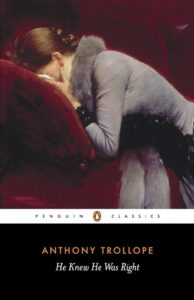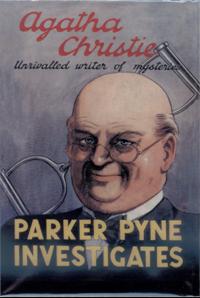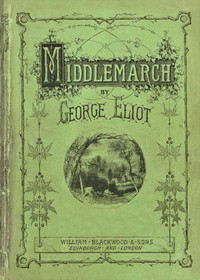 “When I was a girl …. I imagined that life was individual, one’s own affair; that the events happening in the world outside were important enought in their own way, but were personally quite irrelevant.”
“When I was a girl …. I imagined that life was individual, one’s own affair; that the events happening in the world outside were important enought in their own way, but were personally quite irrelevant.”
Category Archives: English Lit
He Knew He Was Right by Anthony Trollope
 “When Louis Trevelyan was twenty-four years old, he had all the world before him where to choose; and, among other things, he chose to go to the Mandarin Islands, and there fell in love with Emily Rowley, the daughter of Sir Marmaduke, the governor.”
“When Louis Trevelyan was twenty-four years old, he had all the world before him where to choose; and, among other things, he chose to go to the Mandarin Islands, and there fell in love with Emily Rowley, the daughter of Sir Marmaduke, the governor.”
My, Anthony Trollope is delightful. I’m convinced that he could write a novel about an ant colony and make it thoroughly entertaining. And entertainment is what we get in this tome about a couple destined to be in a state of conflict, simply because of their own pride.
The Employments of a Housewife in the Country by Samuel Johnson
Well, after so much neglect and inattention, I decided to start up my Deal Me In Challenge again. This time I drew the six of spades ♠️ and what better person to begin with than Samuel Johnson. An essay from Mr. Johnson will always be enlightening and humorous.
The Monk by Matthew Lewis
 “Scarcely had the abbey-bell tolled for five minutes, and already was the church of the Capuchins thronged with auditors.”
“Scarcely had the abbey-bell tolled for five minutes, and already was the church of the Capuchins thronged with auditors.”
Wow! What an appalling book! I had expected something scary but I never expected something quite so perverted. It’s melodramatic and sensational and, while the writing is good, the plot is not necessarily subtle or nuanced. At first, it reminded me of The Mysteries of Udolpho but I soon realized that it was much worse, much, much darker.
Set in Spain during the Inquisition, Lewis’ story follows three main storylines with a cast of intertwining characters.
Three Act Tragedy by Agatha Christie

Three Act Tragedy: “Mr. Satterthwaite sat on the terrace of ‘Crow’s Nest’ and watched his host, Sir Charles Cartwright, climbing up the path from the sea.”
Also Published As: Murder in Three Acts
Detective: Hercule Poirot
Amateur Detectives: Mr. Satterwaite, Sir Charles Cartwright, Hermoine “Egg” Lytton
Published: 1934
Length: 224 pages
Setting: Cornwall, Monte Carlo,
Mr. Parker Pyne Investigates by Agatha Christie

Parker Pyne Investigates: “…. the mere sight of Mr. Parker Pyne brought a feeling of reassurance. He was large, not to say fat; he had a bald head of noble proportions, strong glasses, and little twinkling eyes.”
Detective: Mr. Parker Pyne
Published: November 1934
Length: 251 pages
Setting: London, Geneva, Paris, Venice, Trieste, Constantinople, Damascus, Iraq, Tehran, Shiraz, Delphi, Palma, Dartmouth and other places
Middlemarch by George Eliot
 “Miss Brooke had that kind of beauty which seems to be thrown into relief by poor dress.”
“Miss Brooke had that kind of beauty which seems to be thrown into relief by poor dress.”
I first read Middlemarch during the summer of 2014 and was mesmerized. The lives of the inhabitants were painted in detail and somehow came alive until I was part of the community and involved in all their celebrations and struggles. I finished it in three weeks and then longed to go back. Well, it’s been over ten years since my last read of it and with some more maturity and the input of others, I was curious as to how I would respond upon my second reading.
Brideshead Revisited by Evelyn Waugh
 “When I reached ‘C’ Company lines, which were at the top of the hill, I paused and looked back at the camp, just coming into full view below me through the grey mist of early morning.”
“When I reached ‘C’ Company lines, which were at the top of the hill, I paused and looked back at the camp, just coming into full view below me through the grey mist of early morning.”
I went into this read with some trepidation. I had some experience with books set in this time period of the early to mid-1900s and I haven’t found them very edifying: The Good Soldier, Testament of Youth, The Great Gatsby, etc. There is some sort of depressing pall that seems to have affected the world after the First World War and authors appear to have contracted an especially virulent dose of it. Nevertheless, I thought I would give Waugh and try and see if he could surprise me.
Why Didn’t They Ask Evans? by Agatha Christie

Why Didn’t They Ask Evans?: “Bobby Jones teed up his ball, gave a short preliminary waggle, took the club back slowly, then brought it down and through with the rapidity of lightning.”
Alternate Title: The Boomerang Clue
Detective: Lady Frances “Frankie” Derwent & Bobby Jones, childhood friends
Published: September 1934
Length: 351 pages
Setting: Wales & Hampshire
The Road to Serfdom by F.A. Hayek
 “When the course of civilization takes an unexpected turn — when, instead of the continuous progress which we have come to expect, we find ourselves threatened by evils associated by us with past ages of barbarism — we naturally blame anything but ourselves.”
“When the course of civilization takes an unexpected turn — when, instead of the continuous progress which we have come to expect, we find ourselves threatened by evils associated by us with past ages of barbarism — we naturally blame anything but ourselves.”
I suspect that you would call The Road to Serfdom F.A. Hayek’s magnum opus. It was written in 1944 towards the end of the Second World War, when countries had been exposed to various socialist political experiments and the effect they had on the countries that adopted them were very, very evident. But Hayek did not take for granted that people’s common sense would see the dangers. He was well aware of the hazards socialism still posed with its pernicious ideology and promises of a better future where everyone would be equal, the rich would pay their fair share, and all would be secure within the society.

